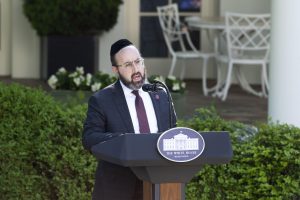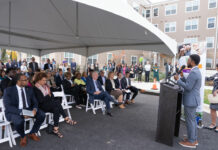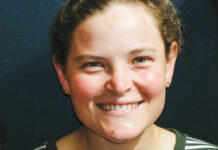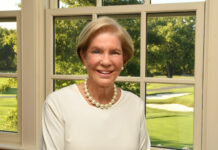How does one go from learning in kollel to becoming a government liaison for the region’s Jewish community? “That was a leap,” said Rabbi Ariel Sadwin, who has served as executive director of Agudath Israel’s government affairs office for the Mid-Atlantic region since its inception 15 years ago. He is also president of the Maryland chapter of CAPE (Council of American Private Education), a national entity of state-level coalitions lobbying in support of private education.

Sadwin, 47, grew up in White Oak in the Greater Washington area, where his parents have lived since 1973. He characterized them as people who always put the needs of others before their own. “That was something that was ingrained in me,” he said.
He attended what is now Berman Hebrew Academy for elementary school, Yeshiva of Greater Washington for seventh through ninth grade, and Ner Israel High School in Pikesville through graduation. He studied in Israel for a few years before returning to the Baltimore area, where he earned his bachelor’s degree through Ner Israel’s Rabbinical College, and his master’s degree and rabbinical ordination through Ner Israel’s Kollel Avodas Levi.
“We were exposed to a lot of things that perhaps in other yeshivahs were not talked about,” he said. There was a strong emphasis not only on community responsibility, but also on pursuing the community’s interests through organizational means.” Leaders at multiple national communal institutions are Ner Israel graduates, he noted, adding that the yeshivah’s Rabbi Herman Neuberger was “an international ambassador for so many things in the government arena.”
Sadwin may have began at the kollel with the expectation that it would lead to a career in the classroom, but his upbringing, the environment at Ner Israel and his success as chairman of its annual fundraising campaign for Torah Schools for Israel from 2004 to 2007 opened him up to other possibilities. In 2007, when Agudath Israel founded its full-time government affairs office serving the Jewish communities of Maryland, the rabbi was appointed as executive director. (Several years later, the office expanded its service area to include Pennsylvania, Virginia and the District of Columbia, and became known as the Mid-Atlantic regional office).
“I did not know a whole lot about government; I did not have a great affinity for the legislative process,” but he said the idea sounded intriguing. He researched what the role would entail and reached out to those in communities across the country where such offices were up and running.
“Had I realized with a crystal ball when I was in my early 20s or late teens that I was headed down this career path, would I have pursued a secular degree? Very likely. But as I’ve said to many people who have assumed that I’m an attorney because so many people in the field are, I’m a talmudical attorney.”
When he started in Annapolis, he said “there was nobody who had roamed those halls looking like me. There were a lot of wide-eyed looks and ‘Who’s this guy?’ ”
He became known simply as “The Rabbi.”
‘The Torah perspective’
Today, “The Rabbi” and his wife, Pessi, live in Northwest Baltimore City (his office is in Pikesville). Their four school-aged children attend Bais Yaakov of Baltimore and Torah Institute; their elder three children graduated from local schools as well. The family belongs to synagogues Kol Torah and Shearith Israel — and, of course, the Agudath Israel shul.
The rabbi said whenever local Jewish institutions need information on obtaining grants or complying with government guidelines, his office is their “go to” source. In March 2020, for instance, the question of whether a woman’s need to go to the mikvah constituted “an essential purpose” in the context of COVID-19 lockdowns was critical to clarify. “It was a process of reaching out and educating, and articulating some of these most sensitive areas of our existence to the authorities, hoping to find somebody who will be sympathetic, understanding, intelligent and capable of processing the request,” he explained.
His office has also been highly involved in discussions on legislation regarding assisted suicide, autopsy policy in homicide cases or unknown cause of death cases, and other sensitive subjects. If someone quotes a biblical verse to support a stance and it is an inaccurate interpretation, it is Sadwin’s job to publicly counter that usage of the Torah. “Not in a protest or a rally manner,” he stated. “We’ll publicize a statement that this is the Torah perspective that we are articulating based on the mesorah [‘tradition’].”
In the course of 15 years in his position, Sadwin has established relationships with lay leaders and rabbis, and it is with their input that he advocates for Jewish communal interests. “I don’t make decisions on my own, unless it’s an area that we’ve already vetted,” he said. “When new issues come up, I’m extremely careful and vigilant to go ahead and make sure that the position that we’re going to take is one that I’m not coming up with on my own.”
He encouraged members of the Jewish community to get involved in supporting policies of importance to them and to make it known that while Jews share religion, they can have very different views. “People oftentimes lump together all Jews or all Orthodox Jews because they’re not familiar with us intricately,” he said. But “everybody’s an individual, and everybody’s different.”
Rachel Kohn is a freelance writer.







